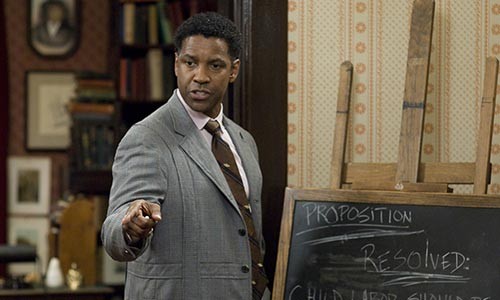In 1935, tiny Wiley College, a black college founded by Methodists in Texas soon after the Civil War, had a few feathers in its cap. Among its personnel were James L. Farmer Sr., then one of the few African Americans to have earned a Ph.D., and Melvin B. Tolson, a well-known professor, poet and labor activist. One of Tolson's sidelines, running a student debate team, is the focus of Denzel Washington's inspirational drama The Great Debaters.
Simply put, the debate team was very good, carrying an undefeated record for several years in competitions against other black colleges. In 1935, Wiley took on the national champs and beat 'em. But, as Debaters takes pains to show, the victory was won not simply in the halls of academe, but in each footstep the team trod through the dusty streets of Jim Crow South.
Led by Tolson, the debate team portrayed here includes the clever but troubled Henry Lowe (Nate Parker); a young woman, Samantha Brooke (Jurnee Smollett); and an academically precocious 14-year-old, James L. Farmer Jr. (Denzel Whitaker). These characters are mostly composites, stitched together from memories of surviving Wiley debaters, and their journey to the national contest is further juiced with a romance. (The actual team did have a woman, as well as the junior Farmer, who grew up to be a significant civil-rights leader.)
Astute filmgoers will note that Robert Eisele's screenplay borrows as liberally from dramatic conventions as it does from historical fact. A number of scenes, including a raucous party deep in the swamp, a conveniently spied union meeting and disturbing incidents of racial attacks, feel more like plot devices than organic narrative. While such incidents do occur in reality, here they feel stagey and calculated.
Debaters also shifts Wiley's big 1935 match-up to Harvard, when it was actually against the University of Southern California, then the national champs. It says something about our collective internalized prejudices that for sheer ballyhoo, we'll accept nothing less than the scrappy underdog versus the Big Kahuna of Higher Learning. And here, the championship arguments turn more on emotion than on reason and rhetoric, revealing the hand of a contemporary writer. While a preview-screening audience loved the hanky-grabs, I suspect that no real debate team worth its salt would pull out such cheap tactics.
Such adjustments might be forgiven in the name of virtuous entertainment. But The Great Debaters is missing sharper analysis that might have made it a more provocative film. As expected, it plays the racism card broadly, but sidesteps questions of class and gender in favor of a feel-good exercise. The characters' deeper struggles are sketched lightly or marked in typical TV-movie fashion. And the toughest part of debating -- defending the unpopular side of an argument -- always falls to the contenders, leaving our players looking morally heroic. (This wholly positive drama comes from Oprah's Harpo Productions.)
As director, Washington keeps the two-hour film moving a steady pace, and the screening audience was well engaged: a bit of murmured approval here, a gasp of outrage there, and then, for the final debate scene, perfect silence. And Eisele successfully incorporates actual 1930s events into the debates -- from Ghandi's civil disobedience and the creation of the American welfare state, to government regulation of labor and the ominous developments in Nazi Germany. These help ground the film historically, but are also topics well chosen to draw parallels with today's ongoing public debates, should any viewer take to heart the film's exhortation to think hard and wide.
As the quietly impassioned Tolson, Washington is effortless. He dominates his scenes, even as the film focuses chiefly on the students. Lending a measure of gravitas is Forest Whitaker, as the elder Farmer. (One of his sermons opens the film, and I wondered why a work about debating didn't make more of the established oral traditions in African-American life, from the persuasive cadences of the pulpit to recited histories passed through generations of illiteracy, and even the clever wordplay of the dozens.) The debate gang is also well portrayed, if oh-so-perfectly coiffed; Denzel Whitaker (no relation to either like-named actor) is especially good as the young teen caught between ambition, fear, puppy love and a dawning sense of outrage.
The Great Debaters, while deeply indebted to formulaic inspirational films, also feels like the smallest bulwark against the ongoing flood of our misguided cinematic imperatives to celebrate wealth, looks, brutishness and individualism over a team effort of intellectualism. It's heartening to hear applause for a film that trumpets “quiet” victories -- those won through education, reasoned argument, everyday courage and the support of families, churches and social institutions -- rather than those won by another quipping, gun-toting anti-hero action star.
The pen (and its cohort, the spoken word) can be mightier than the sword, even if it does move at its own less-immediate pace. And, as if to put his money literally where his mouth is, Washington -- recently seen celebrating a murderous hoodlum in American Gangster -- last week donated a cool million to Wiley College so it could re-instate its long-defunct debate team. Word.















